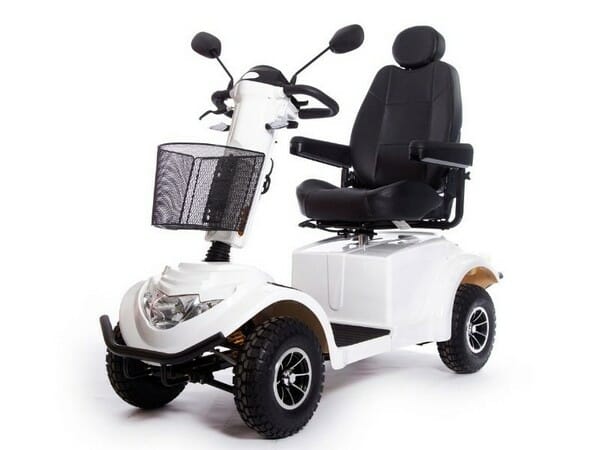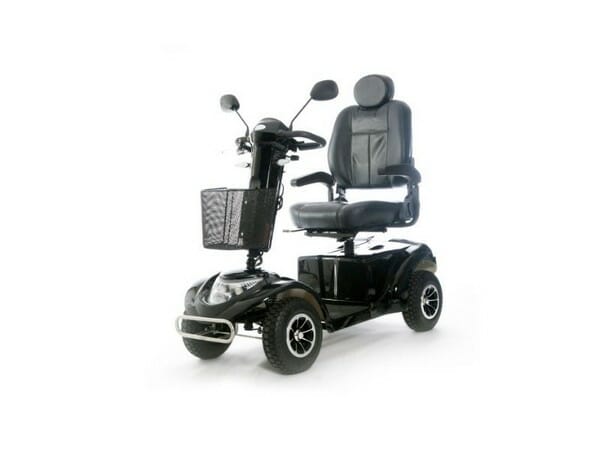The colder weather and the growing desire for maintaining social distance are key factors on the minds of those looking for safe, reliable and convenient ways to travel. And for the countless people struggling with mobility, these additional stressors may make it feel like independent travel is a thing of the past. For example, those with arthritis may find driving difficult at the best of times, not to mention during times of inclement weather. Someone with an amputation affecting their hands or feet may struggle to operate a conventional car. Stroke victims, or even people with specific types of chronic pain, may find driving traditional vehicles taxing to the point of being limiting. Even those who are otherwise functioning independently may have their driving affecting by a disabling condition like those above. It can feel disheartening to lose this aspect of one’s independence, while you are otherwise still capable of other aspects of independent living.
Thankfully, if you are like the thousands of Canadians with limited mobility, there are many options that can help you travel safely and independently this winter.
Today we are partnering with Daymak, a proudly Canadian company in operation since 2001, and one of the largest manufacturers and distributors of Light Electric Vehicles in North America, including mobility scooters. Our goal is to show just how much safe and liberating Mobility Scooters can provide for those facing mobility restrictions, and what type of scooter might be best for you.
Mobility Scooters Do Not Require a License Or Insurance
It’s true. Mobility Scooters, like most light electric vehicles, can be safely and legally operated without a license or insurance. One key reason for this is that Mobility scooters are not designed to reach the speeds of a conventional car. For these reasons, Mobility scooters are intended for use on sidewalks, or on the side of the road where no sidewalk is available.
The good news here is that if you are an individual who needs safe, reliable, and comfortable transportation for short trips, a mobility scooter can provide this without the added hassle of updating your driver’s license, and with no additional insurance expenses. Mobility Scooters can come on a spectrum of affordability and typically require only basic and minimal maintenance.
Mobility Scooters Can Be Used Indoors And Outdoors
While it might sound surprising, depending on the model of mobility scooter that works best for your needs, you may be able to operate your scooter in both indoor and outdoor spaces.
A model like Daymak’s Mobilityinabox (see below), is a great option for those who may be capable of driving, but need assistance in other ways; while shopping for example.

A device like the Mobilityinabox can assemble in minutes out of the box and requires no professional support- making it ready to ride almost immediately after unboxing it. It is easy to transport, which means it can be easily stowed in a car and taken out to be of use indoors, and outdoors.
Light and easily transportable mobility scooters are a great option for people who may only require assistance in certain situations and/or are unable to stay on their feet for long periods at a time but have more independence in other areas, for example, are still comfortable driving.
The advantage of these is that, while they may be smaller and lighter, they can still handle outdoor conditions like sidewalks and designated micro-mobility lanes, and also handle well in indoor environments.
Mobility Scooters With A Modern Feel
We know. Not everyone wants a mobility scooter that looks and feels like a traditional mobility-assistance machine. We get it! Mobility issues affect people across all age demographics and for that reason alone it might be exciting to know that mobility scooters come in a wide variety of styles and choices. For people who are interested in a convenient, clean way to travel that has a little extra curb appeal, mobility scooters such as the Boomerbeast 2 can offer the ability to handle rugged terrain, support heavier loads, offer convenient transportation, and – they look pretty cool.
Mobility Scooters That Can Handle Tougher Road Conditions
There are those with mobility issues that require different needs. Many people find themselves in need of a method of transport that is stronger in different weather conditions. And in still other cases, it may simply be that the individual needs access to something capable of making short, secure trips, without the consistent expense and hassle of the traditional, conventional car. In cases like these, it might be worth considering an option with more privacy and a few more conventional comforts, such as Daymak’s “Boomerbuggy X” Series, which you can see below.

The great thing about this Electric vehicle is that it is fully enclosed, which allows for temperature control, such as the AC and heating. More than that, it offers more storage than a more traditional mobility scooter. While it might be harder to fit into a grocery store with the added bonus its fully enclosed frame offers
How Much Do Mobility Scooters Cost?
Great question! And the truth is it varies greatly depending on what an individual’s needs are. Small, lightweight scooters like the Mobilityinabox start at under $2,000, whereas a fully enclosed scooter like the Boomerbuggy X can start at around $8,000 with additional options for multiple budget types.
Another important factor is to remember that, with a recognized disability, you will be able to claim tax exemptions for your vehicle, such as being able to wave HST and GST on your purchase. If you’ve been able to claim additional tax credits, such as the Disability Tax Credit, or even the CPP-Disability Tax Credit, you may be able to offset the cost of your mobility device even further.
Still Want To Learn More About Mobility Scooters?
We hear you, we think they are pretty neat too. You can find a local distributor of mobility devices in your area with a simple search online, but you can also check out Daymak.com to find out about different types of mobility scooters that span the spectrum of users’ needs and price ranges.
Want to find out more about Tax Credits?
We don’t blame you! If you or someone you love is struggling with mobility, you may be eligible for additional governmental support. To find out if you qualify for assistance, such as the Disability Tax Credit, or the CPP- Disability Benefit, you can check out the resources at Disability Credit Canada!

